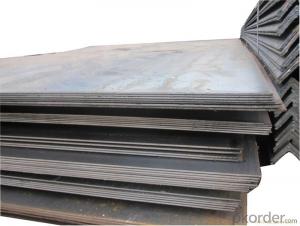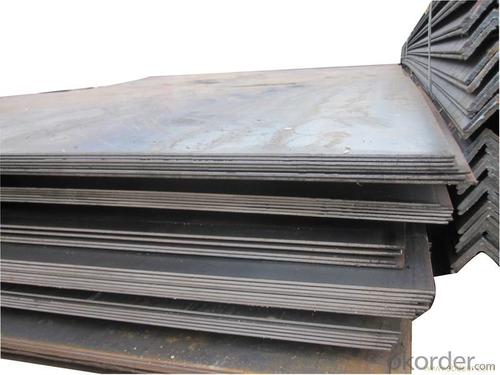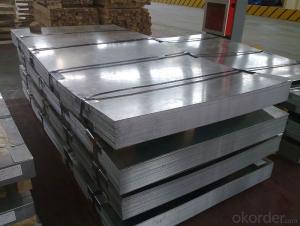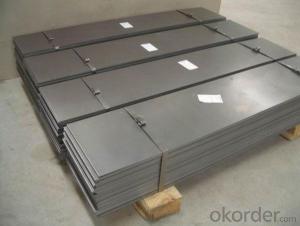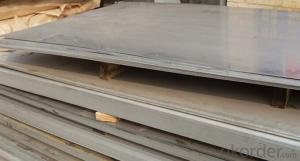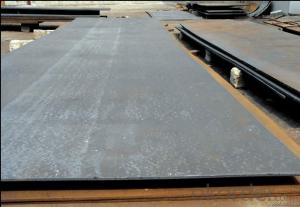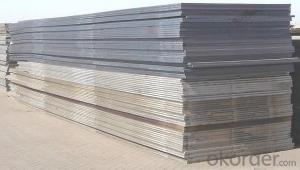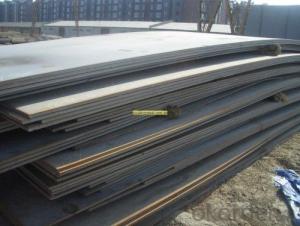Hot Rolled Mild Steel Plate Carbon Steel Sheet
- Loading Port:
- China main port
- Payment Terms:
- TT OR LC
- Min Order Qty:
- 30 m.t.
- Supply Capability:
- 10000 m.t./month
OKorder Service Pledge
OKorder Financial Service
You Might Also Like
Specification
Product Information
Item | Steel sheet,steel plate,mild steel sheet,carbon steel sheet |
Standard | ASTM A285, ASTM A283, SA516, SA517, EN10025-2-2004, ASTM A572, ASTM A529, |
Material | A36,SS400,A283 Gr.A,.Gr.B.Gr.C,A285 Gr.A,.Gr.B.Gr.C,Q235,Q195,Q215,S185,SM400, |
Size | Thickness:2.0-200mm |
Surface | Black painted,PE coated,Galvanized ,etc |
Export to | Iran,India,Dubai,Peru,Saudi Arabia,Indonesia,Singapore,Korea,Viet Nam,Thailand,Brazil, |
Application | Steel plates are widly used as boiler plate, container plate, flange plate and ship plate, and |
Contact | If you have any question ,please feel free to contact me . |
Product Show
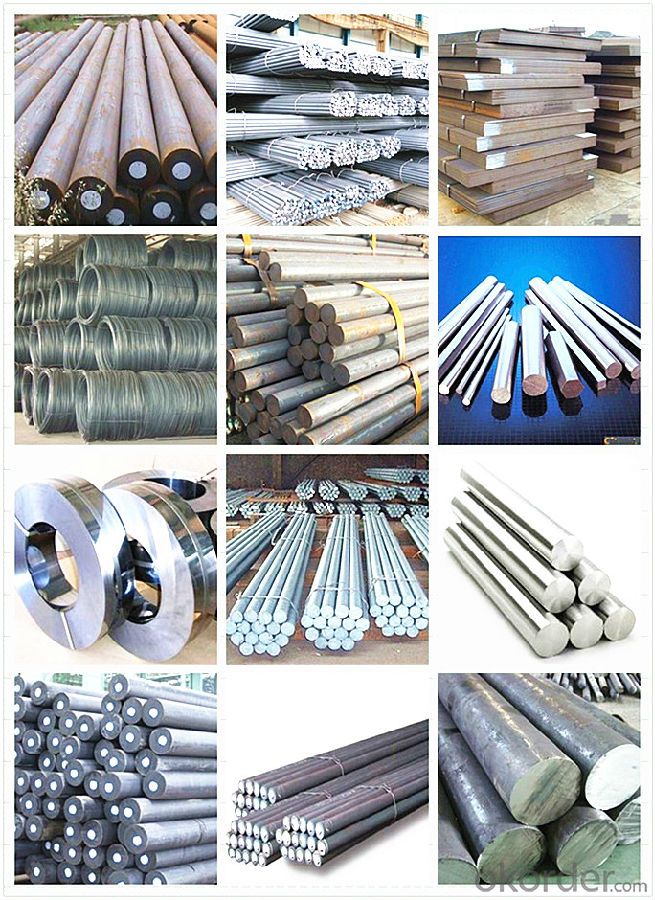
Workshop Show
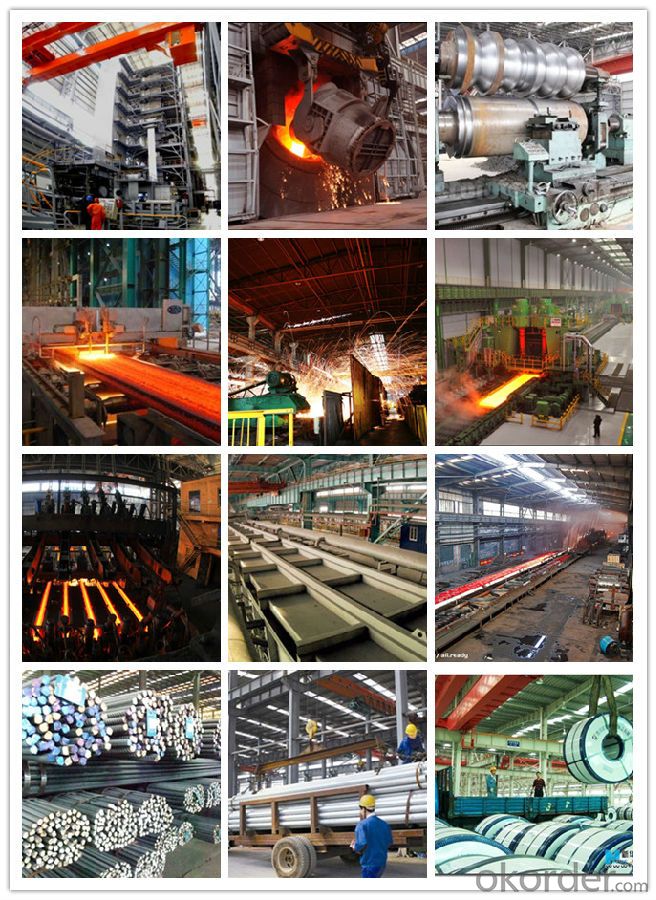
Shipping
1. FedEx/DHL/UPS/TNT for samples, Door-to-Door;
2. By Air or by Sea for batch goods, for FCL; Airport/ Port receiving;
3. Customers specifying freight forwarders or negotiable shipping methods!
Delivery Time: 3-7 days for samples; 5-25 days for batch goods.
Payment Terms
1.Payment: T/T, L/C, Western Union, MoneyGram,PayPal; 30% deposits; 70% balance before delivery.
2.MOQ: 1pcs
3.Warranty : 3 years
4.Package Informations: 1) EXPORT, In 20 feet (GW 25 ton) or 40 feet Container (GW 25 ton)
2)as customer's requirement
Why choose us?
(1) The leading exporter in China special steel industry.
(2) Large stocks for various sizes, fast delivery date.
(3) Good business relationship with China famous factories.
(4) More than 7 years steel exporting experience.
(5) Good after-sales service guarantee.
- Q: What are the requirements for special steel used in low-temperature applications?
- To ensure optimal performance and reliability in low-temperature applications, special steel must fulfill specific criteria. These criteria primarily encompass three crucial factors: toughness, resistance to brittle fracture, and corrosion resistance. Toughness plays a paramount role in low-temperature applications as it determines a material's capacity to absorb energy and withstand cracking or fracturing. High toughness is essential in special steel designed for low-temperature environments, which is typically achieved through the addition of specific alloying elements like nickel and manganese. These elements enhance the steel's ability to endure impact loads and prevent catastrophic failures. Another vital requirement for steel used in low-temperature settings is resistance to brittle fracture. At low temperatures, steel becomes more prone to brittle fracture, which can occur suddenly without any significant deformation or warning signs. To mitigate this risk, special steel for low-temperature applications undergoes specific heat treatment processes to refine its microstructure and enhance its resistance to brittle fracture. Corrosion resistance also plays a crucial role in special steel intended for low-temperature applications. Low temperatures often lead to the formation of ice or condensation, which can introduce moisture and potentially corrosive substances to the steel's surface. Therefore, the steel must possess exceptional corrosion resistance properties to prevent degradation and maintain its structural integrity over time. This is typically achieved by incorporating corrosion-resistant elements such as chromium and molybdenum. In addition to these primary requirements, other factors like dimensional stability, weldability, and cost-effectiveness should also be taken into consideration when selecting special steel for low-temperature applications. The material should exhibit good dimensional stability to retain its shape and mechanical properties under varying temperature conditions. It should also be easily weldable to facilitate construction and maintenance processes. Furthermore, the chosen steel should strike a balance between performance and the overall project budget, ensuring cost-effectiveness. In conclusion, special steel used in low-temperature applications must possess high toughness, resistance to brittle fracture, and corrosion resistance. Meeting these requirements guarantees the steel's reliability and longevity in demanding low-temperature environments, enabling safe and efficient operations in various industries such as cryogenic storage, oil and gas exploration, and transportation.
- Q: How does special steel perform in terms of impact resistance?
- Special steel typically performs very well in terms of impact resistance. Due to its unique composition and manufacturing process, it is able to withstand high amounts of force and pressure without fracturing or breaking. This makes it highly suitable for applications where impact or shock loads are common, such as in construction, automotive, and aerospace industries.
- Q: How does special steel perform in high-temperature fatigue?
- Special steel is renowned for its outstanding performance in conditions of high-temperature fatigue. When exposed to elevated temperatures, special steel demonstrates qualities such as remarkable strength, exceptional resistance to creep, and superior thermal stability. These characteristics render it highly dependable and capable of enduring extended periods of exposure to extreme temperatures without significant deterioration in performance. One of the key factors contributing to special steel's exceptional performance in high-temperature fatigue is its distinct composition. Typically, it contains alloying elements like chromium, molybdenum, and vanadium, which enhance its strength at high temperatures and resistance to thermal fatigue. These alloying elements create stable carbides and nitrides that aid in preserving the material's structural integrity even under intense heat and cyclic loading. Furthermore, special steel undergoes specialized heat treatment procedures, such as quenching and tempering, to further enhance its properties in high-temperature fatigue. These treatments augment the material's microstructure, resulting in increased strength, toughness, and resistance to thermal fatigue. In conditions of high-temperature fatigue, special steel exhibits remarkable fatigue strength and durability, even when subjected to cyclic loading at elevated temperatures. Its high-temperature fatigue limit surpasses that of regular steel significantly, enabling it to withstand repetitive stress and strain without experiencing premature failure. This makes special steel an ideal choice for applications involving high-temperature environments, such as gas turbines, heat exchangers, and aerospace components. To conclude, special steel delivers exceptional performance in high-temperature fatigue conditions due to its unique composition, specialized heat treatment processes, and superior mechanical properties. Its high strength, resistance to creep, and thermal stability make it a reliable and long-lasting material for applications requiring prolonged exposure to extreme temperatures.
- Q: What are the heat treatment processes used for special steel?
- Some of the heat treatment processes used for special steel include annealing, quenching, tempering, and hardening. Annealing involves heating the steel to a specific temperature and slowly cooling it to improve its ductility and reduce internal stress. Quenching is a rapid cooling process that hardens the steel by quickly cooling it from a high temperature, creating a tough and wear-resistant material. Tempering is a process that follows quenching, where the steel is reheated to a lower temperature to reduce brittleness and improve toughness. Hardening involves heating the steel to a high temperature and then rapidly cooling it to increase its hardness and strength. These heat treatment processes are used to enhance the properties and performance of special steel for various applications.
- Q: What are the main factors affecting the heat resistance of special steel?
- The heat resistance of special steel is determined by several key factors, including its alloy composition, microstructure, and heat treatment. The addition of specific elements like chromium, nickel, molybdenum, and tungsten can enhance the steel's ability to withstand high temperatures by forming stable oxide layers on its surface, which protect against oxidation and corrosion. The microstructure of special steel also plays a role in its heat resistance. Factors like grain size, phase distribution, and the presence of precipitates can affect the steel's thermal stability. Fine-grained structures and a homogeneous phase distribution improve resistance to creep, while precipitates like carbides or intermetallic compounds strengthen the steel and prevent thermal softening. Heat treatment processes, such as quenching and tempering, have a significant impact on the heat resistance of special steel. Proper heat treatment optimizes the microstructure and enhances mechanical properties, including resistance to thermal degradation. Controlled quenching, for example, promotes the formation of a martensitic structure, which increases hardness and strength at high temperatures. Other factors that influence heat resistance include impurities, surface conditions, and environmental factors. Impurities like sulfur and phosphorus can reduce resistance to high temperatures by promoting brittle phase formation or oxidation. Surface conditions, such as roughness or cracks, can cause localized heating and accelerated degradation. Environmental factors like corrosive gases or high humidity can also promote oxidation or corrosion. In conclusion, the heat resistance of special steel is affected by alloy composition, microstructure, heat treatment, impurities, surface conditions, and environmental factors. Understanding and optimizing these factors are crucial for developing special steel with superior heat resistance for various industrial applications.
- Q: Is special steel suitable for manufacturing molds and dies?
- Yes, special steel is well-suited for manufacturing molds and dies due to its exceptional hardness, durability, and resistance to wear and deformation. Special steels like tool steel or high-speed steel possess superior mechanical properties, such as high tensile strength and toughness, making them ideal for withstanding the high pressure and temperature conditions involved in mold and die manufacturing processes. Additionally, special steels can be easily machined and heat-treated to achieve the desired hardness and precision required for creating intricate molds and dies.
- Q: How does special steel contribute to the automotive engine industry?
- Special steel plays a crucial role in the automotive engine industry by providing superior strength, durability, and performance to various engine components. The unique properties of special steel make it an ideal choice for manufacturing critical parts, such as crankshafts, connecting rods, camshafts, valves, and cylinder liners. One of the key contributions of special steel to the automotive engine industry is its exceptional strength and resistance to high temperatures. Special steel alloys are designed to withstand the intense heat and pressure generated within an engine, ensuring that these components maintain their structural integrity and functionality under extreme conditions. This durability translates into increased engine efficiency, reliability, and longevity. Moreover, special steel's superior mechanical properties, including high tensile and impact strength, allow for the production of lighter yet stronger engine components. By reducing the weight of these parts, special steel helps to enhance fuel efficiency and reduce emissions, making it an environmentally friendly choice for automotive manufacturers. Special steel also contributes to the automotive engine industry by enabling the production of more complex and precise engine components. The excellent machinability and formability of special steel alloys allow for intricate designs, tighter tolerances, and improved performance. This, in turn, contributes to the overall efficiency and power output of the engine. Furthermore, special steel's corrosion resistance properties are crucial in preventing engine components from deteriorating over time. The ability to resist rust and other forms of corrosion ensures that the engine operates at optimal levels for an extended period, reducing maintenance costs and improving overall performance. In summary, special steel's unique properties, including strength, durability, heat resistance, and corrosion resistance, make it an essential material in the automotive engine industry. Its contribution lies in providing superior performance, efficiency, and longevity to critical engine components, ultimately enhancing the overall driving experience for consumers.
- Q: How does special steel contribute to the performance of industrial machinery?
- The role of special steel in enhancing the performance of industrial machinery is crucial in multiple ways. Firstly, its superior mechanical properties, including high strength, hardness, and toughness, make it suitable for withstanding heavy loads, vibrations, and impact forces commonly encountered in industrial applications. This enables the machinery to operate efficiently and reliably under demanding conditions. Additionally, special steel's excellent corrosion resistance is particularly important in industries where machinery is exposed to harsh environments or corrosive substances. By preventing component degradation due to corrosion, special steel helps extend the machinery's lifespan and reduce maintenance costs. Furthermore, manufacturers can tailor special steel to specific applications through various alloying elements and heat treatments. This optimization allows for properties like wear resistance, heat resistance, or high-temperature strength to meet the specific requirements of industrial machinery. By using special steel, manufacturers can achieve higher performance levels and improve overall efficiency. Moreover, special steel offers superior dimensional stability and machinability. This ensures precise manufacturing of components, reducing the potential for errors or inaccuracies that may affect machinery performance. The machinability of special steel also allows for easier fabrication and assembly, improving the overall production process and reducing manufacturing costs. In conclusion, special steel significantly contributes to the performance of industrial machinery through its superior mechanical properties, corrosion resistance, tailorability, dimensional stability, and machinability. By incorporating special steel into machinery components, manufacturers can enhance durability, reliability, and efficiency, ultimately leading to improved productivity and profitability in various industries.
- Q: How is HSLA steel used in the construction industry?
- HSLA steel, or High-Strength Low-Alloy steel, is widely used in the construction industry due to its superior strength and durability. It is commonly utilized in the construction of bridges, buildings, and other infrastructure projects. HSLA steel's high tensile strength allows for the creation of lighter and more efficient structures, reducing material costs and environmental impact. Additionally, its resistance to corrosion and atmospheric conditions makes it suitable for outdoor applications, ensuring the longevity of the constructed assets.
- Q: What are the different methods for shot peening special steel?
- There are several methods for shot peening special steel, including air blast peening, wheel blast peening, and centrifugal peening. Air blast peening involves directing a stream of shot particles onto the surface using compressed air, while wheel blast peening uses a rotating wheel to propel the shot particles. Centrifugal peening utilizes a spinning wheel to throw the shot particles onto the steel surface. Each method has its own advantages and is used based on the specific requirements of the steel and the desired outcome of the shot peening process.
Send your message to us
Hot Rolled Mild Steel Plate Carbon Steel Sheet
- Loading Port:
- China main port
- Payment Terms:
- TT OR LC
- Min Order Qty:
- 30 m.t.
- Supply Capability:
- 10000 m.t./month
OKorder Service Pledge
OKorder Financial Service
Similar products
Hot products
Hot Searches
Related keywords
